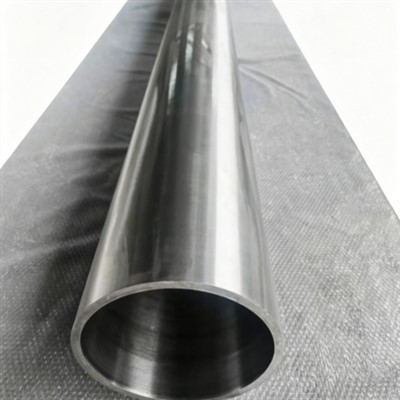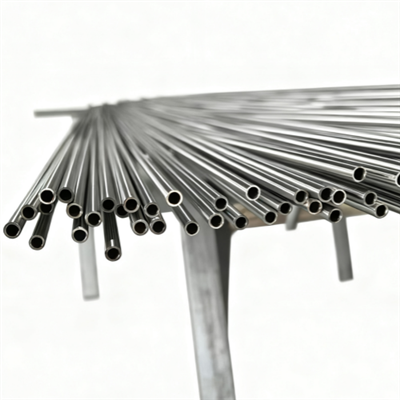Alloy 20, also known as Carpenter 20, is a nickel-iron-chromium based, austenitic alloy that was developed for maximum resistance to acid attack, specifically sulfuric acid. As a leading supplier of Alloy 20 Pipe, I am often asked about its corrosion resistance. In this blog post, I will delve into the details of what makes Alloy 20 Pipe highly corrosion-resistant and why it is a preferred choice in many industries.
Composition of Alloy 20
The unique corrosion resistance of Alloy 20 Pipe starts with its composition. It typically contains around 32 - 38% nickel, 19 - 21% chromium, 2 - 3% molybdenum, and 3 - 4% copper, along with small amounts of other elements such as niobium and manganese. The high nickel content provides excellent resistance to chloride stress corrosion cracking and general corrosion in a variety of environments. Chromium enhances the alloy's resistance to oxidation and forms a passive oxide layer on the surface, which protects the underlying metal from further corrosion. Molybdenum improves the pitting and crevice corrosion resistance, especially in chloride-containing solutions. Copper contributes to the alloy's resistance to sulfuric acid, making it suitable for applications involving this aggressive acid.
Corrosion Resistance in Different Environments
Sulfuric Acid
One of the most remarkable features of Alloy 20 Pipe is its outstanding resistance to sulfuric acid. Sulfuric acid is a widely used industrial chemical, but it is highly corrosive. Alloy 20's copper content plays a crucial role in its performance in sulfuric acid environments. The copper forms a protective layer on the surface of the pipe, which inhibits the reaction between the acid and the metal. This allows Alloy 20 Pipe to be used in processes such as sulfuric acid production, pickling operations, and chemical processing where sulfuric acid is present.
Chloride Environments
Chloride ions are known to cause severe corrosion problems, including pitting and stress corrosion cracking, in many metals. However, Alloy 20 Pipe exhibits good resistance to chloride-induced corrosion. The high nickel and molybdenum content in the alloy helps to prevent the initiation and propagation of pits and cracks in chloride-containing solutions. This makes it suitable for use in coastal areas, desalination plants, and other applications where chloride exposure is inevitable.
Oxidizing and Reducing Environments
Alloy 20 Pipe can perform well in both oxidizing and reducing environments. In oxidizing environments, the chromium in the alloy forms a stable oxide layer that protects the metal from further oxidation. In reducing environments, the alloy's composition provides good resistance to corrosion by preventing the dissolution of the metal. This versatility makes Alloy 20 Pipe suitable for a wide range of applications, from chemical processing to food and beverage production.
Comparison with Other Alloys
When considering corrosion-resistant alloys, it is important to compare Alloy 20 Pipe with other similar alloys. For example, Inconel 718 Tubing is a high-strength nickel-chromium alloy that is known for its excellent mechanical properties and corrosion resistance at high temperatures. While Inconel 718 Tubing has its own advantages, Alloy 20 Pipe offers better resistance to sulfuric acid and is more cost-effective in many applications.
Alloy 825 Pipe is another alloy that is often compared to Alloy 20. Alloy 825 is also a nickel-iron-chromium alloy with good corrosion resistance. However, Alloy 20 has better resistance to sulfuric acid, especially in the intermediate concentration range.
Inconel 625 Pipe is a nickel-chromium-molybdenum alloy with excellent corrosion resistance in a wide range of environments. It is often used in high-temperature and high-pressure applications. While Inconel 625 Pipe has superior corrosion resistance in some extreme conditions, Alloy 20 Pipe is a more practical choice for many general industrial applications due to its cost and performance balance.
Applications of Alloy 20 Pipe
The corrosion resistance of Alloy 20 Pipe makes it suitable for a variety of applications in different industries. Some of the common applications include:
- Chemical Processing: Alloy 20 Pipe is widely used in chemical processing plants for transporting corrosive chemicals such as sulfuric acid, phosphoric acid, and various salts.
- Food and Beverage Industry: The alloy's resistance to corrosion and its non-toxic nature make it suitable for use in food and beverage production, including dairy processing, brewing, and winemaking.
- Pharmaceutical Industry: In the pharmaceutical industry, Alloy 20 Pipe is used for the transportation of various chemicals and solutions, where corrosion resistance and product purity are critical.
- Oil and Gas Industry: Alloy 20 Pipe can be used in oil and gas production, especially in environments where the presence of corrosive substances such as hydrogen sulfide and carbon dioxide is a concern.
Conclusion
In conclusion, Alloy 20 Pipe offers excellent corrosion resistance in a wide range of environments, thanks to its unique composition. Its resistance to sulfuric acid, chloride ions, and both oxidizing and reducing environments makes it a versatile choice for many industrial applications. When compared to other alloys, Alloy 20 Pipe provides a good balance between cost and performance.


If you are looking for a reliable supplier of high-quality Alloy 20 Pipe, look no further. Our company is committed to providing the best products and services to meet your specific needs. Whether you are in the chemical processing, food and beverage, pharmaceutical, or oil and gas industry, we have the expertise and experience to help you find the right solution. Contact us today to discuss your requirements and start a successful partnership.
References
- ASM Handbook Volume 13A: Corrosion: Fundamentals, Testing, and Protection.
- Metals Handbook Desk Edition, Third Edition.





